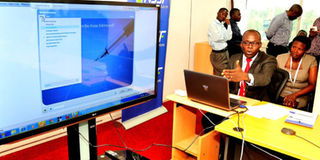NSSF to boost contributions by tapping into government registers

NSSF manager in-charge of talent development and training Joseph Ajal demonstrates to staff how e-learning works, in Kampala last week. PHOTO BY MICHAEL KAKUMIRIZI
What you need to know:
Fund wants to track down companies that are supposed to be paying workers’ contributions but are not.
Kampala- National Social Security Fund (NSSF) will use registers of government institutions that have records of licensed businesses in the country to identify companies that should be remitting workers contributions to the Fund but are not doing so.
According to the managing director of NSSF, Mr Richard Byarugaba, arrangements are already underway to partner with Uganda Revenue Authority (URA), Kampala Capital City Authority (KCCA) and Uganda Registration Service Bureau (URSB) and use their registers to bring on board companies that are supposed to be paying workers monthly contribution.
Speaking last Wednesday after the launch of E-Learning System, an initiative aimed at improving competences and skills among NSSF staff countrywide, thereby reducing its staff development budget by nearly 40 per cent, Mr Byarugaba said the partnership with the cited agencies will enhance compliance.
He said: “We are going to improve our audits and it is important that we partner with URA, KCCA, and URSB so that we get to know who is on board and who is not so that we can have those that are not in our system captured and follow them up.”
When contacted, URA spokesperson, Ms Sarah Birungi Banage, said the tax body is willing to cooperate. URSB too, said they will work with the Fund.
Attempts to get the KCCA’s view on the matter were unsuccessful.
This will not be the first partnership of the kind. In similar effort, URA has also partnered with URSB and KCCA to hunt down tax defaulters and widen its tax base.
FUND LAUNCHES E-LEARNING
NSSF has launched an e-learning system aimed at improving competences and skills among its staff countrywide, thereby reducing its staff development budget by nearly 40 per cent.
While addressing staff at the launch of the system at Workers House last week, Mr Byarugaba said that the system will offer NSSF employees with relevant and cost effective programmes, improve performance culture, and enable the Fund to create more value for its members.
The Fund is among the first institutions in Uganda to implement e-learning. The system will enable staff access world class training, including prestigious Harvard managerial courses. It will also enable the Fund to address training and learning needs of all the staff.
Speaking at the event, former Tullow Uganda board chairman Elly Karuhanga applauded the innovation, and encouraged the Fund to continue automating its systems to cut down cost of doing business.



